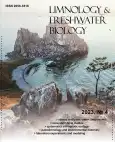Annual temperature regime of the shallow zone of Lake Baikal inferred from high-resolution data from temperature loggers
- Autores: Fedotov A.P.1, Khanaev I.V.1
-
Afiliações:
- Limnological Institute Siberian Branch of the Russian Academy of Sciences
- Edição: Nº 4 (2023)
- Páginas: 119-125
- Seção: Articles
- URL: https://bakhtiniada.ru/2658-3518/article/view/292300
- DOI: https://doi.org/10.31951/2658-3518-2023-A-4-119
- ID: 292300
Citar
Texto integral
Resumo
Annual changes in temperature characteristic of the shallow zone during 2017-2022 have been studied in this work. Dataset was contrasted based on 8 transects located in South, Central and Northern Baikal at depths of 3, 4, 6, 12, 15 and 26 m. Temperatures were measured every 1.5-3 hour. It was determined that modal values of maximal heating of the shallow zone at all stations and depths were 15-16°C, however, distribution of maximal temperatures of South Baikal shifted toward the low temperatures, and these maximums could be only 9-10°C. Temperature regime of the shallow zone during warm seasons is characterized by sharp changes due to wind mixing and upwelling, when temperature drops dramatically from 16-18°C to 4°C for the 1-1.5 day. In most cases, the duration of stabile temperature condition without wind mixing was 4 days. On average, upwelling events occurred 5 times (maximum - 13 events) from July to November. As a result of wind mixing, the shallow zone is characterized as moderately warm with average temperatures of 6-7°C from June to November. A temperature effect on the shallow zone of Lake Baikal due to the Global warming is smoothed by cooling of the zone by deep waters during upwellings.
Palavras-chave
Sobre autores
A. Fedotov
Limnological Institute Siberian Branch of the Russian Academy of Sciences
Autor responsável pela correspondência
Email: mix@lin.irk.ru
Rússia, 3 Ulan-Batorskaya Str., Irkutsk, 664033
I. Khanaev
Limnological Institute Siberian Branch of the Russian Academy of Sciences
Email: mix@lin.irk.ru
Rússia, 3 Ulan-Batorskaya Str., Irkutsk, 664033
Bibliografia
- Domysheva V., Vorobyeva S., Golobokova L. et al. 2023. Assessment of the current trophic status of the Southern Baikal littoral zone. Water 15: 1-14. doi: 10.3390/w15061139
- Izhboldina L.A. 2007. Guide and key to benthonic and periphyton algae of lake Baikal (meio- and macrophytes) with short notes of their ecology. Novosibirsk: NAUKA. (in Russian)
- Kravtsova L., Vorobyeva S., Naumova E. et al. 2021. Response of aquatic organisms communities to global climate changes and anthropogenic impact: evidence from Listvennichny Bay of Lake Baikal. Biology 10: 1-22. doi: 10.3390/biology10090904
- Maximova N.V., Melnikova E.N., Shirokaya A.A. et al. 2012. Seasonal and inter-annual distribution of Gastropoda in three hydrodynamic stony littoral zones of Lake Baikal. Ruthenica 22: 1-14.
- Ozersky T., Volkova E.A., Bondarenko N.A. et al. 2018. Nutrient limitation of benthic algae in Lake Baikal, Russia. Freshwater Science 37: 472-482. doi: 10.1086/699408
- Potemkina T.G., Potemkin V.L., Kotsar O.V., Fedotov A.P. 2018. Climate factors as a possible trigger of modern ecological changes in shallow zone of Lake Baikal (Russia). International Journal of Environmental Studies. 75: 86-98. doi: 10.1080/00207233.2017.1406727
- Shimaraev M.N., Troitskaya E.S. 2018. Current trends in upper water layer temperature in coastal zones of Baikal. Geography and Natural Resources. 39: 349-357. doi: 10.1134/S187537281804008X
- Shimaraev M.N., Troitskaya E.S., Blinov V.V. et al. 2012. On upwellings in Lake Baikal. Doklady Earth Sciences 442: 272–276.
- Shimaraev M.N., Verbolov V.I., Granin N.G. et al. 1994. Physical limnology of Lake Baikal: a review. Irkutsk-Okayama: Baikal International Center for Ecological Research.
- Sitnikova T.Ya. 2006. Endemic gastropod distribution in Baikal. Hydrobiologia 568: 207-211.
- Timoshkin O.A., Samsonov D.P., Yamamuro M. et al. 2016. Rapid ecological change in the coastal zone of Lake Baikal (East Siberia): Is the site of the world’s greatest freshwater biodiversity in danger? Journal of Great Lakes Research 42: 487-497. doi: 10.1016/j.jglr.2016.02.011
- Troitskaya E., Blinov V., Ivanov V. et al. 2015. Cyclonic circulation and upwelling in Lake Baikal. Aquatic Sciences 77: 171-182. doi: 10.1007/s00027-014-0361-8
- Verbolov V.I., Pokatilova T.N., Shimaraev M.N. et al.1986. Formation and dynamics of Baikal waters. Novosibirsk: Nauka. (in Russian)
- Votintsev K.K. 1961. Hydrochemistry of Lake Baikal. In: Galaziy G.I. (Ed). Moscow: Publishing House of the Academy of Sciences of the USSR. (In Russian)
Arquivos suplementares









